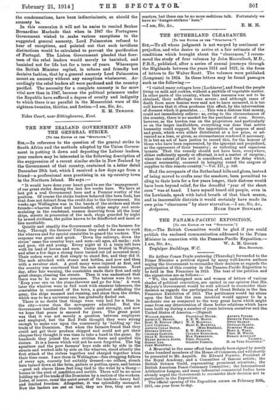THE SUTHERLAND CLEARANCES.
[TO TIM EDITOR OF 110 ..SFLOTATOR...1
Sin,—To all whose judgment is not warped by sentiment or prejudice, and who desire to arrive at a fair estimate of the conditions which brought about the "clearances," I recom- mend the study of four volumes by John Macculloch, M.D., F.R.S., published, after a aeries of annual journeys through the Highlands between the years 1811 and 1821, in the forro of letters to Sir Walter Scott. The volumes were published (Longman) in 1824. In these letters may be found passage& such as the following :—
"I visited many cottages here [Lochinver), and foand the people living on milk and cockles, without a particle of vegetable matter. In other parts of the country, where this resource was not to be obtained, their sufferings were severe ; and although eases of death from mere famine were said not to have occurred, it is too well known that it often produces this effect, by the intervention of diseases which it generates. Thin was a distress that money,. could not immediately relieve, as, owing to the circumstances of the country, there is no market for the purchase of corn. Severe, however, as the burden was on the proprietors and particularly Co on the larger landholders, everything was done that active humanity could suggest, by the importation of cargo.), of meal. and grain, which were either distributed at a low price, or ad- vanced as a loan, or given, as circumstances rendered it necessary. It is but an act of bare justice to record this, for the honour of those who have been represented, by the ignorant and prejudiced, as the oppressors of their tenantry; as unfeeling and rapacious tyrant.. That the remedy should not have been, everywhere, either sufficiently speedy or effectual, is not smatter of surprise; when the extent of the evil is considered, and the delay which, almost necessarily, occurred in bringing round the cargoes of supplies to this remote country."—Vol. III., p. 349.
Had the occupants of the Sutherland hills and glens, instead of being moved to crofts near the seashore, been permitted to. cling to their huts for a few years longer, their distress would have been beyond relief, for the dreadful "year of the short corn" was at hand. I have myself heard old people, even in the Lowlands, speak with bated breath of that black season, and in inaccessible districts it would certainly have made its own grim " clearances " by sheer starvation.—I am, Sir, du,














































 Previous page
Previous page